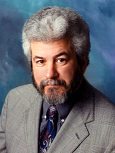 Have you ever thought about the very first time you heard music?
Have you ever thought about the very first time you heard music?
You're probably reflecting on those unforgettable lullabies that even
now seem to melt into feelings of warmth and coziness. Settling into
an expression of love never to be forgotten, you finally surrendered
to wondrous possibilities of a dream world where new adventures were
bound to unfold. As mother's voice progressively faded into a safe
and predictable distance, your heartbeat slowed, your muscles relaxed
and you let go.
You were naturally lulled to sleep, just as you had been from almost
the beginning. Amidst a rhythmical lub-dub, you evolved within an
ocean of sloshing amniotic fluid amplified by a rich cacophony of
membranes, muscles and bones. A part of you probably still remembers
the first symphony you ever heard a few months prior to seeing the
world unfold around you.
It doesn't take a stretch of the imagination to realize music's impact
on our lives. There's no doubt it has the power to orchestrate our
emotional tone. Music can trigger just about any emotion - it can
bring joy to our hearts or sadness in anticipation of pain, loss, or
separation. Music sends our boys to war and announces their return in
parades or funerals. It brings tears to our eyes even before the
couple acknowledges "I do," and it inspires us to lead the charge when
our team is behind in the last quarter. It enables us to celebrate
life, to sing and to dance, and it centers us peacefully in prayer or
meditation.
Music has also been considered a universal language.
As a child, I remember hearing that phrase as I repeatedly practiced
Bach and stared at a marble bust of Mozart that sits in my office
today. My piano teacher explained that music revealed a common theme.
It was understood by everyone - everyone but me. She said that while
different languages separated people by impeding communication, music
united them. The problem at age 8, however, was that I didn't get it.
As a child, I couldn't comprehend the in-depth message, emotion and
suffering revealed by some of the most famous works ever composed.
For me, certain compositions expressed what I frankly didn't
understand. Yet I still practiced day after day for many years.
Eventually, under the tutelage of Maestro Edgar Shiffman, the former
youngest head professor of the Conservatory of Vienna who fled during
the Holocaust, I found myself at the pinnacle of my less than
inspiring musical career at age 14.
The anxiety and panic experienced that Sunday in New York City will
never be forgotten. Steinway Hall itself was frightening,
intimidating and overwhelming. The theatre was a formal relic of
music's past, and backstage was as dark, gloomy and as cold as what I
imagined hell to be. Any semblance of music in my heart was replace
by rumblings in my stomach which were the only sounds I heard, and
they were far from settling.
After a wait that seemed eternal, I finally entered the stage and sat
before the longest monster of a piano I had ever seen in my life. It
wasn't just an ordinary Steinway. Its keys had been caressed and
pounded by the most highly acclaimed pianists in the world -
extraordinary people who truly understood the music.
To make matters worse, the piano before me was paired side by side
with an identical instrument to be played by an accomplished musician
who had already established a favorable relationship with those keys
on several occasions.
That duet with the maestro was an honor and a curse. It was unnerving
beyond my expectations. As hard as I tried, there were no
remembrances of lullabies or the music of my soul. Yet surprisingly
without struggle, the piece seemed to flow automatically. The music I
didn't seem to comprehend protected me in a cocoon of heightened
mental focus.
Ultimately, even the applause and bravos elicited somber sentiments.
I considered them no more than accolades for a performance closely
matching what the composer supposedly intended hundreds of years ago.
I realized that a door was closing - a bittersweet farewell to a part
of my life that I could no longer endure.
That last concert was a perceived failure. It represented a waste of
all the money spent on piano lessons and a disappointment to my
parents. Yet it didn't make sense even at 14 to overshadow the
memories of those lullabies my grandmother sang, the hymns I chanted,
or the school songs we bellowed that made me feel so good inside.
As I look back, what was once considered a failure is now the guiding
light for a physician incorporating music as a healing strategy in
traditional medicine. It was a painful yet important lesson. I now
realize that music is not a universal language in the context
previously stated.
All forms of music are not understood, appreciated or enjoyed by
everyone. Culture and preference must be considered in every form of
music therapy. Enjoyment rather than performance should be emphasized
at all ages. For a certain type of music to be healing, it has to
resonate with one's soul - it must be comprehended deep within.
When music listening or performance is matched to our needs and
preferences, a part of us naturally reconnects with the first symphony
we ever heard. When we do so, it becomes obvious that music can
become a universal language. When it resonates with what we love,
music truly unites mind, body and spirit - Mind Over Matter!
© 1999 Barry Bittman,
MD all rights reserved
Contact Dr. Bittman